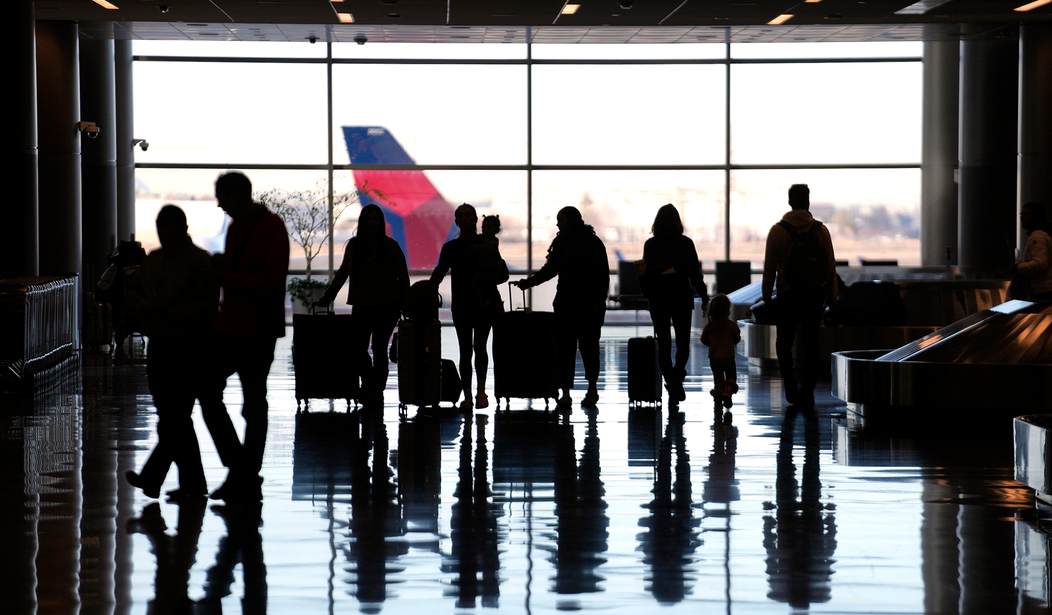Your flight is delayed? Blame your government.
OK, it's not always government's fault. Sometimes it's weather or mechanical problems. But often we suffer horrible flight delays because politicians won't relinquish power.
In January, flights were grounded when the government's "Notice to Air Missions" system broke down. That was just the latest incident.
America rightly prides itself on being on the cutting edge of innovation. But it's the private sector that innovates. Government rarely does.
Asked if America's air traffic control system is out of date, Transportation Secretary Pete Buttigieg paused a long time before answering, "The system is continuously being upgraded."
But the government's been "upgrading" air traffic control for decades, promising to switch to a "NextGen" system that uses satellite navigation. But implementation keeps being postponed. Now the Federal Aviation Administration won't even say when NextGen might be done.
Air traffic control is still a lot like it was in the 1960s. Controllers use paper strips to track flights. Instead of using computers, they move paper around manually.
"This is your government at work," says Diana Furchtgott-Roth in my latest video. Furchtgott-Roth worked for the Transportation Department during the Trump administration.
I yell at her. "Air traffic control was in your department. You could have fixed it. You should have fixed it!"
She smiles and explains that although she had control of $1 billion, she wasn't allowed to move those funds to where they were needed.
Government managers must fund projects pushed by politicians, like "Justice40," meant to fix "underinvestment in disadvantaged communities."
Recommended
"Sounds like they mean well," I say.
"It sounds a lot better to talk about social justice," answers Furchtgott-Roth. "Nuts and bolts like computer hardware for air traffic control gets left behind."
Computer hardware isn't left behind in Canada. They got rid of "flight control with paper strips" years ago. That's because Canada turned air traffic control over to a private company. They switched to an electronic system.
It's not just Canada that did it. Dozens of countries have privatized or partially privatized.
Computer screens have replaced not-always-clear windows in many air traffic control centers. Controllers don't use binoculars anymore because high-definition cameras let them see much more, especially at night.
A Government Accountability Office study found that in countries that privatized, there are fewer delays and costs are lower.
So why doesn't America privatize?
Because our politicians get money from labor unions, who "advocate for keeping the same people in the same jobs," says Furchtgott-Roth.
Another opponent is the private plane lobby. Under our current system, Congress makes sure that the big airlines, which you fly, subsidize private flights' air traffic fees.
"If they have private planes," says Furchtgott-Roth, "they should be able to pay their fair share." Yes. Today's pricing amounts to welfare for rich people.
A third obstacle is fear. "For-profit companies will cut corners and make flying less safe!" But this is nonsense. That GAO study found that safety stayed the same or improved in countries that privatized.
Also, "For-profit companies actually run the airlines!" Furchtgott-Roth points out.
The airlines get FAA supervision, but the main reason planes don't crash is because the private companies don't want to destroy their business by killing their customers.
There hasn't been a commercial airline crash in 14 years.
By contrast, government-run airlines do crash. Aeroflot (the Soviet airline) killed thousands of people.
"What ensures high quality is competition," says Furchtgott-Roth. There wasn't any competition in the Soviet Union.
And there isn't any at the FAA.
Today, computers controlling air traffic in other countries keep getting better. In America, privatization would reduce delays and make flying even safer.
But our arrogant politicians won't allow it. They insist government run things.
Since governments rarely innovate, you must sit at the airport and wait.

























Join the conversation as a VIP Member